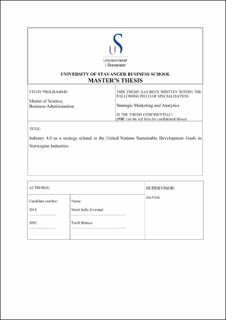| dc.description.abstract | The new industrial revolution, known as Industry 4.0, is becoming increasingly important within Norwegian companies. Industry 4.0 is a future-oriented strategy and could be significant for maintaining and improving companies’ competitiveness. Further, the importance of sustainability has increased in the last few years, which resulted in the United Nations (UN) Sustainable Development Goals (SDGs) and associated subgoals. Additionally, the triple bottom line (TBL) has been developed based on the term sustainability. This thesis aims to research how Industry 4.0 as a strategy is related to the UN SDGs within Norwegian industries.
As there exist limited studies related to Industry 4.0 combining Sustainability within Norwegian industries, a qualitative method is conducted. A literature study is executed based on a comprehensive literature search to acquire relevant data. This thesis consists of Industry 4.0 technologies provided by Bai, Dallasega, Orzes, and Sarkis (2020), and Oztemel and Gursev (2020), which evaluate Industry 4.0 technologies from a sustainable perspective. Further, the thesis analyzes the UN subgoals based on their relevance within Norwegian companies utilizing Industry 4.0 technologies. The relevant subgoals and Industry 4.0 technologies are linked with the TBL to generate the finding of this thesis.
Industry 4.0 allows for automated processes and decreased human interaction. Conclusively, it decreases the cost of human labor, increases production efficiency, and reduces waste. Additionally, rural companies in Norway could experience the demand for workforce exceeding the supply due to rural flight. Thus, Industry 4.0 is related to economic sustainability and SDG8.2. Further, automated processes reduce employee’s exposure to dangerous work tasks and are therefore related to social sustainability and SDG3.d. Industry 4.0 increases the demand for a qualified workforce, indicating reskilling of employees. Social sustainability and SDG4.4 are thus correlated. The technologies’ facilitation for local production results in shorter transportation routes, thus, reducing gas emissions. This is related to environmental sustainability and SDG9.4. Industry 4.0 also correlates with SDG12.5 and environmental sustainability, as it allows Norwegian companies to forecast demand and reduce overproduction. | |
